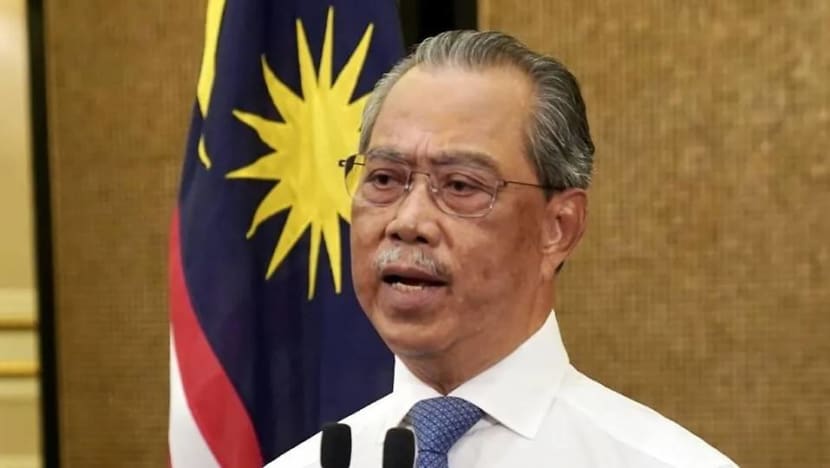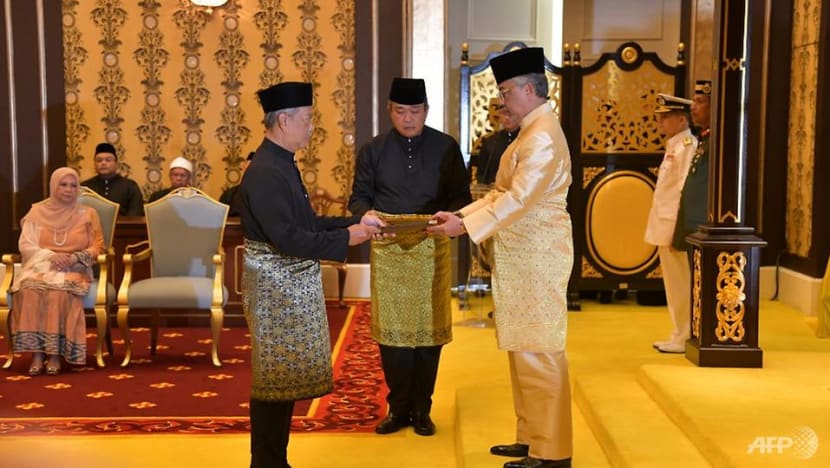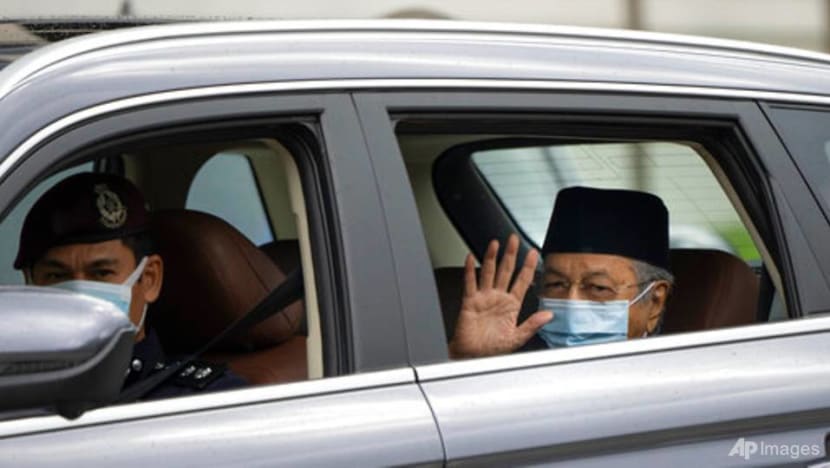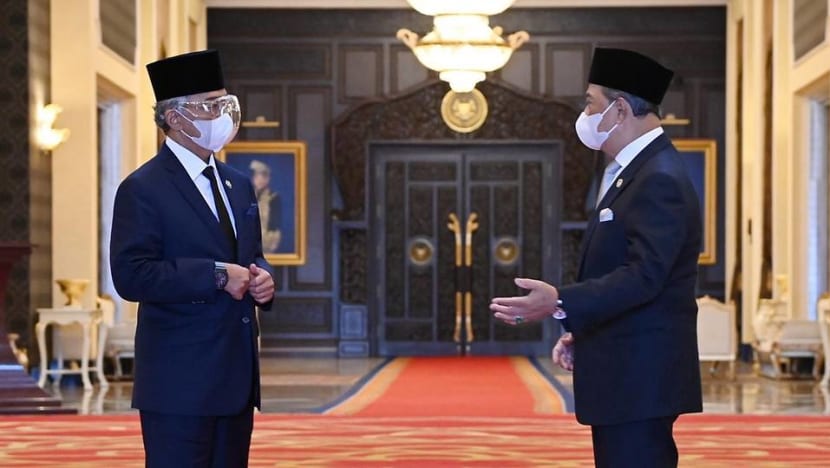Commentary: Malaysia PM Muhyiddin’s hand could be forced as pressure mounts for COVID-19 accountability
PM Muhyiddin Yassin’s government could always have Parliament reconvene but push out bills without them needing to go through legislative scrutiny, says Oh Ei Sun.

Malaysia's Prime Minister Muhyiddin Yassin unveiling the Pemerkasa package on Mar 17, 2021. (Photo: Bernama)
SINGAPORE: Amid a raging pandemic, Wednesday (Jun 16) was an especially tense day for political observers and common folks alike in Malaysia.
Malaysian King Al-Sultan Abdullah Ri’ayatuddin Al-Mustafa Billah Shah met with the other eight Malay traditional monarchs in a special session of the Conference of Rulers, a high-level constitutional body that enables these state rulers to play some, albeit limited, role in the affairs of the nation as a whole.
The agenda of the special meeting, at least as officially announced, was focused on the staggering pandemic situation in the country.
But popular and pundit expectations mounted nonetheless, partly because in the preceding week, the king had also summoned leaders of various elected political leaders, both from the ruling coalition and the opposition.
Malaysians were wondering whether the king’s consultations could herald an impending change in government after the country experienced a fresh, towering wave of infections.
READ: Commentary: Will Malaysian king take PM Muhyiddin’s government to task for huge COVID-19 mess?
THE BIG ROLE THE KING PLAYED LAST YEAR
The last time the king did that was in late February last year, after a number of Members of Parliament switched allegiance, bringing about the downfall of the then Pakatan Harapan (PH) government.
The king had to ascertain which leader was likely to command the confidence of a parliamentary majority.
The majority determination back then seemed inconclusive, but the king later decided to appoint Muhyiddin Yassin as prime minister nonetheless.
But Muhyiddin’s “lucky” clinching of the premiership as somewhat of a dark-horse candidate had emboldened a number of aspiring prime ministerial candidates to hope for the same fate for themselves this time around.

READ: Commentary: Malaysia's government rests on an uneasy pact
A SEA CHANGE IN PUBLIC OPINION
You can’t blame them. The ground seemed ripe for disruption. Public sentiments have recently turned against Muhyiddin’s government, as new coronavirus infection numbers continued to climb in Malaysia, despite numerous rounds of movement control orders (MCOs) being imposed, relaxed, only to be reimposed again.
For many, the coronavirus has come up close and personal, as they helplessly witnessed their loved ones and friends succumb to infection.
People’s livelihoods were also turned upside down, as they had to painfully adjust to a new socioeconomic normal where income, if any, tended to be paltry and uncertain.
READ: Commentary: Resurgent pandemic sparks unemployment crisis among Malaysia’s most vulnerable workers
READ: Commentary: Johor city dwellers hit hard by MCO but rural communities fare worse
Many pinned the main blame on the government, what with the latter’s many flip-flops in ill-thought out policies and its slow, haphazard vaccination drive.
Numerous moves, such as the continued imposition of an emergency and the attendant suspension of Parliament, seemed motivated by a consolidation of political power rather than being aimed at combating the unruly pandemic.
Such speculation could have been dismissed as baseless but the government did not even bother to address such claims. And so they were left to stew.
AN OPPORTUNISTIC PUSH FOR CHANGE
Several opportunistic prime ministerial wannabes sensed this shift in the tide of public perceptions to push for change in the country’s top leadership.
Dr Mahathir Mohamad, Muhyiddin’s predecessor and longtime political stalwart, mooted the idea of an all-powerful special council, not surprisingly with himself heading it, citing his vast experience as Malaysia’s longest serving former prime minister.

Hishammuddin Hussein, the foreign minister, nursed his rumoured ascension and galvanised a coalition within UMNO by only cursorily dismissing gossip that Azmin Ali could be his number two.
Even Tengku Razaleigh, a veteran long dormant in the political arena, emerged from semi-retirement to toss his hat into the premiership ring.
MUHYIDDIN UNFAZED
But as the date of the rulers’ special meeting approached, Muhyiddin concocted a preemptive plot to secure his political future.
He appeared unfazed, as he curiously rolled out a somewhat belated national pandemic recovery plan the day before the Conference, with various phases and timeline stretching until the end of the year.
In it included the possibility of holding Parliamentary in September or October at the earliest, assuming the pandemic subsides substantially then.
But the only way Parliament could legally be convened that late is if the emergency were to be extended, say until the end of the year. If nothing else, Muhyiddin’s plan involves stonewalling calls for an earlier sitting.
READ: 'It has to be an all Malaysian effort': Businesses, lawmakers roll out perks for COVID-19 vaccination
READ: Commentary: What’s behind no-shows in vaccination centres across Malaysia?
Although positioned as a response to public pressure and respect for the Conference of Rulers, Muhyiddin had basically presented a fait accompli.
Should the king decide to retain Muhyiddin’s government, the Yang di-Pertuan Agong would essentially be lending his support to the plan.
A DOUBLE DECISION
And so when the king decided not only should Parliament be convened as soon as possible but also that the state of emergency should not be extended beyond August, some interpreted this to be a slap in the face for Muhyiddin’s government.
The king has teeth to back up these decisions as he has the power to refuse an extension of emergency rule, as he exercised last October.
But Muhyiddin played dumb. He merely noted the king’s latest urging for parliament to be reconvened but conspicuously ignored the Conference of Ruler’s statement on the state of emergency, side-stepping such calls by saying he would act in accordance with the constitution.
His law minister from the Islamist PAS Takiyuddin Hassan even intoned that holding Parliament in September or October could also be construed to be “as soon as possible”.

The Palace may have been less than impressed with the appearance that the royal message on parliamentary urgency did not quite get through. It posted a reminder on its Facebook page that “parliament should be held as soon as possible”, with these words initially bolded.
Public opinion and political parties meanwhile began taking up the Palace’s position to amplify a rallying call for Parliament to sit right away.
A PRETTY GOOD PLAN
Although it looked like developments over the past week has been a net minus for Muhyiddin, however, he has effectively creating more political space for himself.
By focusing on two things Muhyiddin’s government can do – convene Parliament or resume governance without emergency rule come Aug 1 – the reality is Muhyiddin now has choice between the two. He could even trade one off for the other.
There’s nothing stopping him from demonstrating good faith to convene Parliament expeditiously, in exchange for an emergency extension, perhaps through a combination of persuasion and entreatment of the royals.
A Parliament in session is actually quite harmless to the Muhyiddin government’s survival. It could always utilise its parliamentary procedural advantage to block motions of no confidence brought against him, as he did in past occasions.
Besides, as long as the emergency is in force, he could essentially emasculate Parliament by rendering it to be no more than a debating club even in session.
Important laws can continue to be directly promulgated by his government, bypassing the legislative ambit of Parliament.
Such a course of action, although possible would be uncomfortable, even unbecoming and emphatically detrimental to the essence of parliamentary democracy, where important laws and issues require oversight of elected lawmakers, which is probably why Muhyiddin had been reluctant to convene Parliament early.
It would be ironic if Parliament sits only to discuss public concerns but is left toothless to change laws or prevent the sitting government of the day from taking drastic actions inimical to the national interest.
But if Muhyiddin’s government senses its resolute hold on power is being threatened, with the clock running down before August, we should not put it past them to effectuate such drastic actions.
(Listen to Malaysians in Sabah, Johor and Kuala Lumpur share how they have been coping fighting a new wave of COVID-19 infections in Heart of the Matter podcast.)
Oh Ei Sun is a senior fellow with the Singapore Institute of International Affairs.














